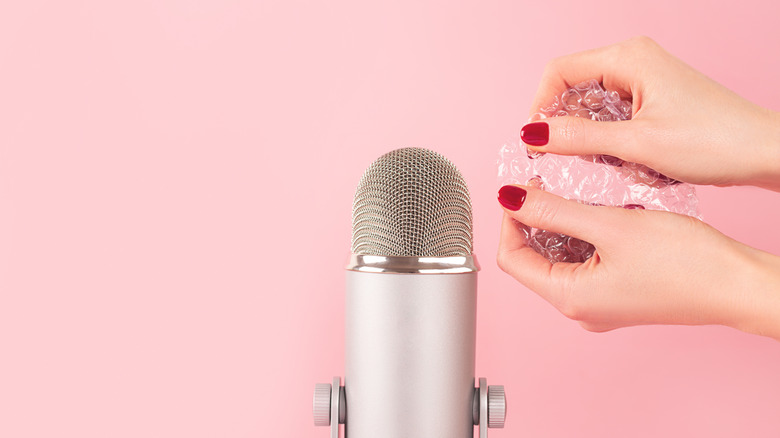ASMR Responses Are More Common For These Personality Types
You might have seen videos on TikTok or YouTube for ASMR, or autonomous sensory meridian response. From rhythmically popping bubble wrap to mixing paint, ASMR can feel satisfying and soothing in a surprising way. But could ASMR be more pleasurable for some than others?
ASMR is a calming, pleasant sensation that can happen when you hear certain sounds like whispering, or watch certain visuals like someone cooking, according to Healthline. It started as a relatively unknown phenomenon on YouTube that quickly caught the attention of researchers and scientists. The ASMR sensation usually begins at the top of the head and spreads through the spine and limbs, invoking feelings of calm and relaxation (via Verywell Mind). Studies show that ASMR may work by lowering the heart rate, prompting your brain to relax and recognize that no anxiety or fear is present.
However, not everyone experiences this response. If you've ever gotten chills from listening to someone type or felt tingly while watching someone brush their hair, you might have experienced ASMR. Until recently, scientists weren't sure why this response happened for some and not others. But new evidence reveals it may be due to certain personality traits.
Are you likely to experience ASMR?
A new 2022 study published in the journal PLOS ONE observed a group of 64 participants watching a video triggering the ASMR response. Half reported being able to experience the response, and half could not. The researchers concluded that two specific personality traits were linked to the participants who experienced ASMR.
They found that the participants who experienced ASMR all scored higher for neuroticism and anxiety, including pre-video anxiety that dissipated after watching. Dr. Paul Poulakos, a board-certified psychiatrist, tells Healthline, "Neuroticism is a personality trait that elicits individuals to experience negative affect such as anxiety, depression, frustration, jealousy, etc." Trait anxiety is found in those who are predisposed to being anxious rather than in-the-moment anxiety. Researchers concluded that if you experience neuroticism and trait anxiety, you may be more likely to experience the pleasant effects of ASMR.
However, experts of the study acknowledged that more research is needed. ASMR can be very subjective, and factors like the placebo effect may be at play. There is still much more to be understood about ASMR.


